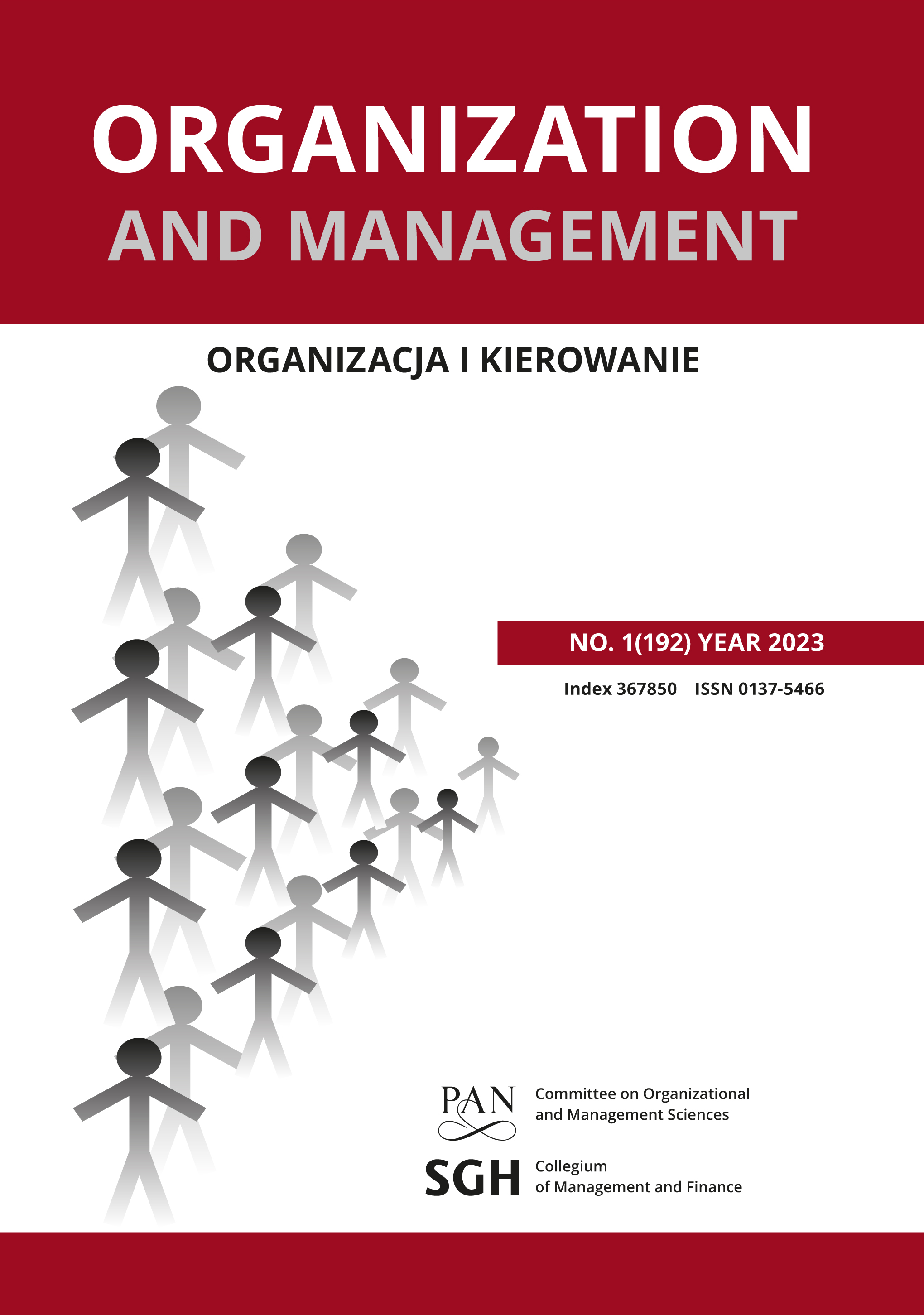English
Main Article Content
Abstrakt
Leadership talent management (LTM) is one of the crucial aspects of HRM nowadays, which can decide of an organization success. The first step in building organizationally adapted capital of leaders is during the process of onboarding. The main goal of the article is to identify and explain the differences between the way of leadership talents onboarding before and during pandemic COVID-19. Research on this topic in MNCs headquartered in Central Europe is of an innovative character, tries to fill in the research gap. The research sample includes 200 non-financial business entities with Polish capital, whose headquarters are in Poland, and local subsidiaries are located outside the country. The research was conducted using CATI method. Descriptive, correlation statistics and Principal Component Analysis (PCA), were used to analyze the collected empirical data.
The fundamental regularity observed in empirical research confirm that there are difference in approach to onboarding of leadership talents before and during a pandemic COVID-19, which in difficult conditions is based on analysis of different aspects of leadership relationships, deepen the knowledge of needs, expectations and measurement of behavior, not just treating it as the next stage of staffing.
Article Details
Bibliografia
2. Armstrong M. [2007], Zarządzanie zasobami Ludzkimi. Wolters Kluwer Polska: Warszawa.
3. Bauer T. N. [2013], Onboarding New Employees: Maximizing Success. SHRM, https://www.shrm.org/hr-today/trends-and-forecasting/special-reports-and-expert-views/, Documents/Onboarding-New-Employees.pdf [21.04.2022]
4. Bauer T. N., Erdogan B. [2011], Organizational socialization: The effective onboarding of new employees. In S. Zedeck (Eds.), Maintaining, expanding, and contracting the organization Handbooks in psychology, Handbook of industrial and organizational psychology, American Psychological Association 3:51–64.
5. Björkman I., Ehrrooth M., Makela K., Smale A., Sumelius J., [2017], Talent management in multinational corporations, (in:) Collings D. G., Mellahi K., Cascio W. F. [2017], The Oxford Handbook of Talent Management, Oxford University Press.
6. Chillakuri B. [2020], Understanding Generation Z Expectations for Effective Onboarding, Journal of Organizational Change Management, https://doi.org/10.1108/JOCM-02-2020-0058 [21.04.2022]
7. Collings D. G., Mellahi K., Cascio W. F. [2017], The Oxford Handbook of Talent Management, Oxford University Press.
8. Drucker P. F. [2004], Zawód menedżer, Wyd. MT Biznes.
9. Elset J. I. [2018], Organizational socialization in remote-working companies: enhancing company onboarding through gamification, https://repositorio.iscteiul.pt/bitstream/ 10071/18803/1/master_john_iver_elset.pdf [22.04.2022].
10. Fagerholm F., A. S. Guinea A.S, J. Borenstein, Münch J. [2014], Onboarding in Open Source Projects, IEEE Software 31(6), https://citeseerx.ist.psu.edu/viewdoc/download? doi=10.1.1.673.6091&rep=rep1&type=pdf [24.04.2022].
11. Global Talent [2021], Oxford Economics, http://www.scm.oas.org/ pdfs/2013/ CIDI03946E.pdf.
12. Global Talent Trends [2022], Mercer, https://www.mercer.com/our-thinking/career/global-talent-hr-trends.html.
13. Głodowska A., Pera B., Wach K., [2019], International strategy as the facilitator of the speed, scope, and scale of firms' internationalization, Journal of Management and Business Administration. Central Europe Open Access 27(3):55 – 84.
14. Haromszeki Ł. [2010], Przywództwo w czasie kryzysu, [in:] T. Listwan, (Eds.), Zarządzanie w sytuacjach kryzysowych podczas Euro 2012, Wydawnictwo Uniwersytetu Ekonomicznego we Wrocławiu, Wrocław.
15. Haromszeki Ł. [2022], Coexistence of talent management and leadership programs as an important competitive factor in MNCs. (in:) Ł. Haromszeki (Eds.), Leadership, Employee and Competency Development for Better Talent Management in the Face of the Dynamics of Environmental Changes. Publishing House of Wroclaw University of Economics and Business, Wrocław, 13–28.
16. Harpelund Ch., Nielsen M., Hjoberg M. [2019], Onboarding: Getting New Hires off to a Flying Start, Emeral Publishing, Bingley, UK.
17. Ingram T. (Eds.) [2011], Zarządzanie talentami, Polskie Wydawnictwo Ekonomiczne.
18. Kawka T. [2010], Dobór pracowników, [in:] Zarządzanie kadrami, red. T. Listwan, CH Beck, Warszawa.
19. Kawka T., and Wróbel P. [2022], The concept of measuring the efficiency of the virtual onboarding process in the IT sector. [in:] Ł. Haromszeki (Eds.), Leadership, employee and competency development for better talent management in the face of the dynamics of environmental changes, Wydawnictwo Uniwersytetu Ekonomicznego we Wrocławiu, Wrocław, 99:111.
20. Klein H. J., Polin, B. [2012], Are Organizations Onboard with Best Practice Onboarding? I. C. Wanberg, (Eds.), The Oxford Handbook of Socialization, Oxford University Press, New York.
21. Mikołajczyk K. [2022], "Changes in the approach to employee development in organisations as a result of the COVID-19 pandemic", European Journal of Training and Development, 46(5/6),544:562. https://doi.org/10.1108/EJTD-12-2020-0171.
22. Miś A. [2020], Zarządzanie talentami w polskich organizacjach, Wydawnictwo Wolters Kluwer.
23. Moe N.B., Stray V., Goplen M.R. [2020], Studying Onboarding in Distributed Software Teams: A Case Study and Guidelines, EASE '20: Proceedings of the Evaluation and Assessment in Software Engineering, April 2020,150:159, https://doi.org/10.1145/3383219.3383235 [14.04.2022].
24. New talent strategy, Society for HRM [2020], https://www.shrm.org/hr-today/news/hr-news/pages/cms_015460.aspx.
25. Pocztowski A., Urban P., Miś A. [2020], Talent Management in Small and Medium Enterprises Context, Practices and Outcomes, Routledge, New York.
26. Scullion H., Caligiuri P. M., Collings D. G. [2019], Global talent management, Taylor & Francis.
27. Stor M. [2023], Human Resources Management in Multinational Companies: A Central European Perspective. Routledge, Taylor & Francis Group. New York & London.
28. Talent Management, Human capital Institute, Hewitt, [2021], https://www.studocu.com/en-za/document/damelin/public-personnel-management/talent-management/15220223.
29. Talent Management: Employers’ Views, Kaplan [2018], https://kaplan.co.uk/docs/default-source/pdfs/kaplan_talent_management_whitepaper.pdf?sfvrsn=2.
30. Tarique I. (Eds.) [2022], Contemporary Talent Management, A Research Companion, Routledge, New York.
31. Wang J., Hutchins H. M., Garavan T. N. [2009], Exploring the strategic role of human resource development in organizational crisis management. Human Resource Development Review, 8(1), 22:53.
32. Wróbel P. [2021], Zarządzanie zdalnymi pracownikami. Specyfika, wyzwania i rozwiązania, Wydawnictwo Uniwersytetu Gdańskiego, Gdańsk.
